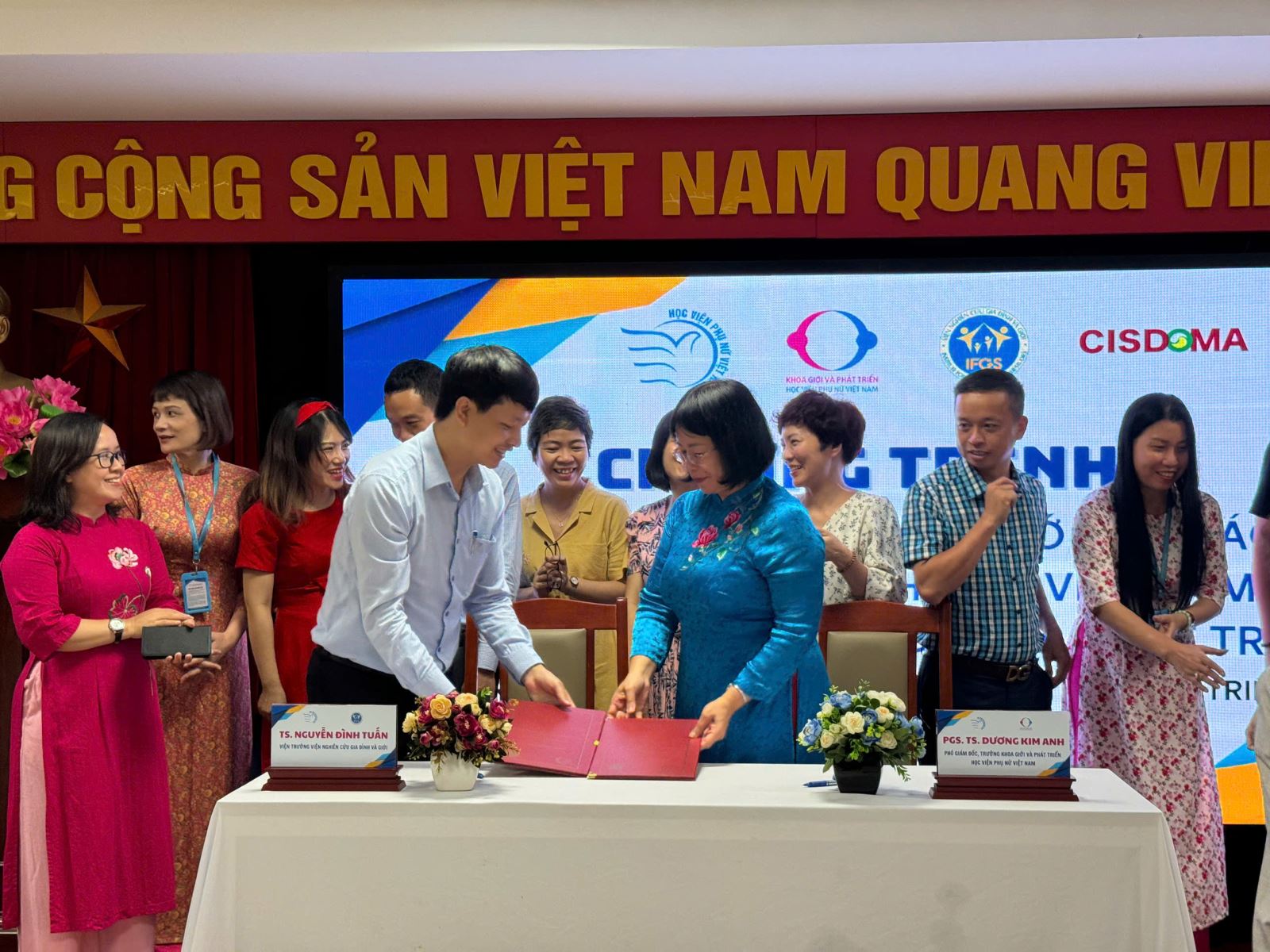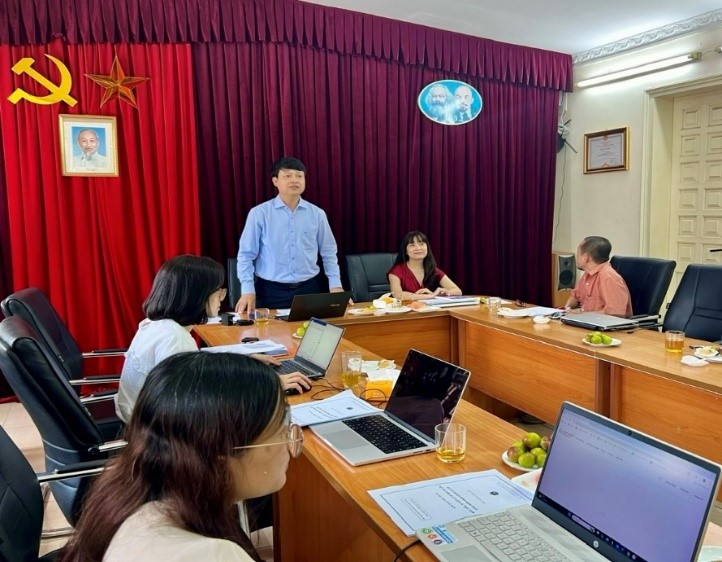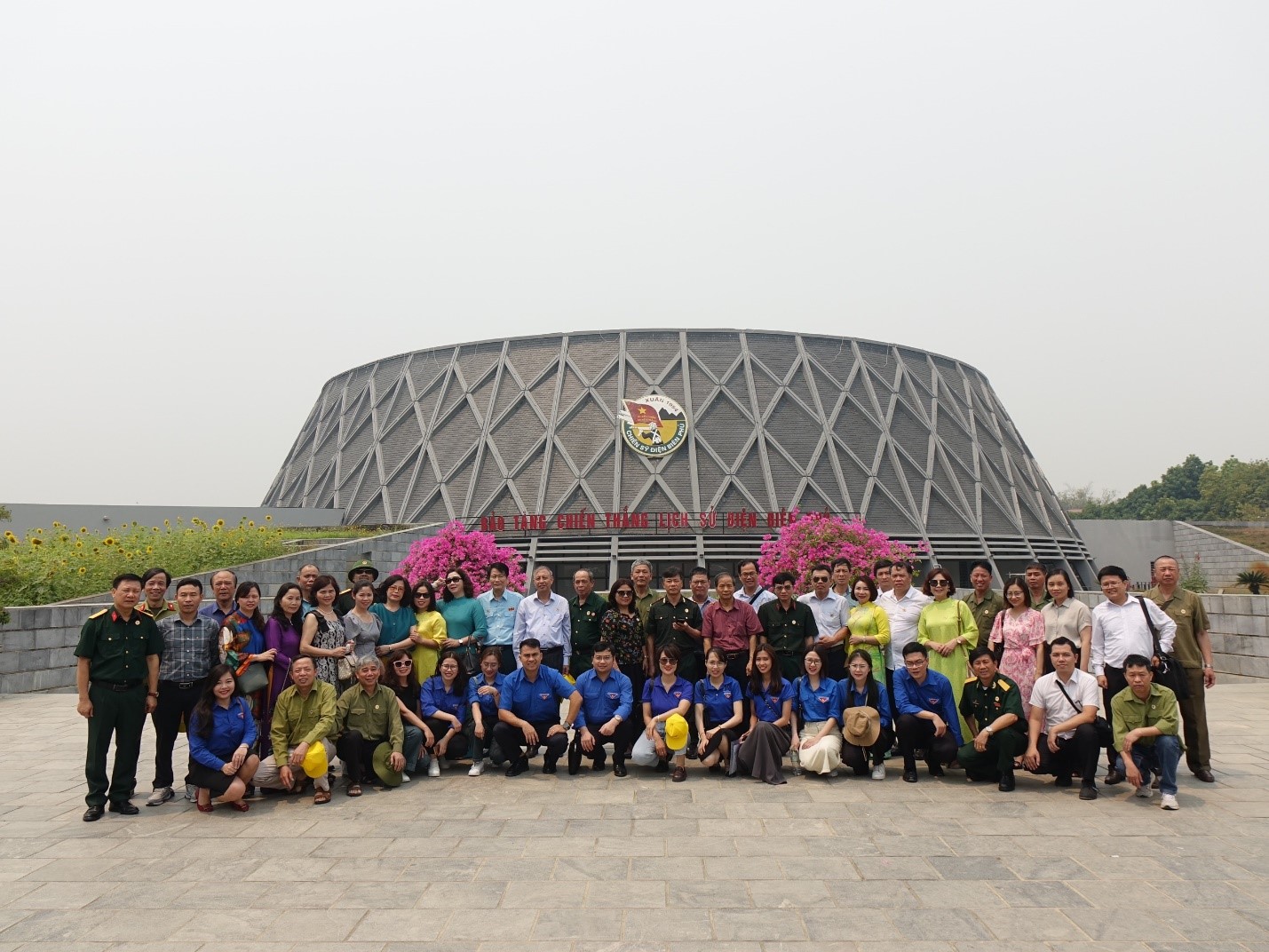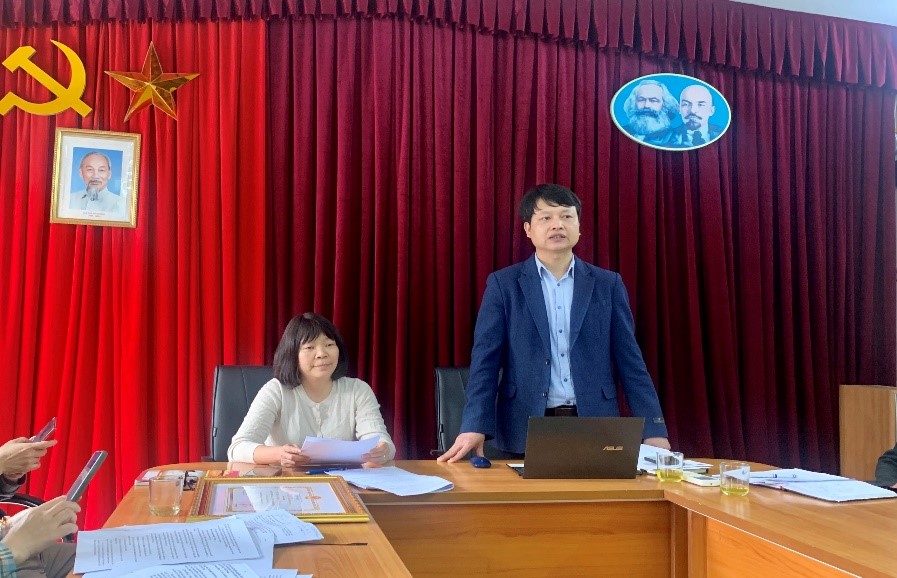Điểm nhấn
-
 Hội thảo “Thực trạng người Việt Nam hồi hương từ Vương quốc Anh giai đoạn 2014 - 2023”
Hội thảo “Thực trạng người Việt Nam hồi hương từ Vương quốc Anh giai đoạn 2014 - 2023”
-
 Lễ Ký kết biên bản ghi nhớ hợp tác giữa Học viện Phụ nữ Việt Nam với Viện Nghiên cứu Gia đình và Giới
Lễ Ký kết biên bản ghi nhớ hợp tác giữa Học viện Phụ nữ Việt Nam với Viện Nghiên cứu Gia đình và Giới
-
 Hội thảo khoa học: "Bộ chỉ số gia đình hạnh phúc: Một số vấn đề lý luận và thực tiễn"
Hội thảo khoa học: "Bộ chỉ số gia đình hạnh phúc: Một số vấn đề lý luận và thực tiễn"
-
 Tọa đàm khoa học "Vận dụng lý thuyết trong nghiên cứu khoa học xã hội"
Tọa đàm khoa học "Vận dụng lý thuyết trong nghiên cứu khoa học xã hội"
-
 Hội nghị Đối thoại giữa Chi ủy, Lãnh đạo viện với đảng viên, viên chức và người lao động Viện nghiên cứu Gia đình và Giới 6 tháng đầu năm 2024
Hội nghị Đối thoại giữa Chi ủy, Lãnh đạo viện với đảng viên, viên chức và người lao động Viện nghiên cứu Gia đình và Giới 6 tháng đầu năm 2024
-
 Chi bộ Viện nghiên cứu Gia đình và Giới tổ chức sinh hoạt chuyên đề: Đoàn kết thống nhất trong Đảng theo tư tưởng Hồ Chí Minh
Chi bộ Viện nghiên cứu Gia đình và Giới tổ chức sinh hoạt chuyên đề: Đoàn kết thống nhất trong Đảng theo tư tưởng Hồ Chí Minh
-
 Cuộc thi “Nét đẹp và giá trị gia đình Việt Nam” hưởng ứng Ngày Gia đình Việt Nam 2024
Cuộc thi “Nét đẹp và giá trị gia đình Việt Nam” hưởng ứng Ngày Gia đình Việt Nam 2024
-
 Hội Cựu chiến binh, Đoàn Thanh niên Viện Hàn lâm Khoa học xã hội Việt Nam đi thăm lại chiến trường xưa Điện Biên Phủ
Hội Cựu chiến binh, Đoàn Thanh niên Viện Hàn lâm Khoa học xã hội Việt Nam đi thăm lại chiến trường xưa Điện Biên Phủ
- Tổng mục lục Tạp chí 2023
-
 Viện nghiên cứu Gia đình và Giới phát động phong trào thi đua và ký Giao ước thi đua năm 2024
Viện nghiên cứu Gia đình và Giới phát động phong trào thi đua và ký Giao ước thi đua năm 2024
Liên kết web
Số lượt truy cập
23
5407463
Chi tiết tạp chíNo. 2 - 2019
The Role of the Family in Daily Care for the Elderly in Changing Rural Vietnam
Abstract: Using data from the two researches on elderly care in Vietnam, this article aims to evaluate the role of family members, especially women, in elderly care and find out the difficulties that families face in order to execute this care function nowadays. Moreover, this article determines which factors influence health care for the elderly by family members, at a time of major changes in the rural society in Vietnam.The research results show that the family plays an important role in elderly care and that women’s role is very preponderant. Family provides the elderly with mental-material and instrumental support (including housework and health care support in daily life and during sickness). Among the factors that influence elderly health care, are demographic and economic characteristics such as gender, age, education, health status, financial resource, living conditions, etc. All have a significant impact on the level of dependence to family.
Adapt to Aging through Intergenerational Self-Help Club: Case Study of Vietnam
Abstract: The speed of population aging in Vietnam is among the fastest ever projected, top five in the world according to United Nations Population Fund. Meanwhile, the country is still at developing stage, with low middle-income level. This combination of limited time and resources makes it harder for Vietnam to address demographic transition. The Vietnamese government has been learning from other countries’ experience, especially Japan. Nevertheless, the differences in social, economic situation, speed of the aging process and level of development suggest that Vietnam should also consider a tailored approach. Since 2006, the country has been implementing a community led model called Inter-generational Self-help Club (ISHC). The ISHC model has proved to be sustainable, comprehensive, affordable and effective. The model receives strong buy in from the government and the community and has been integrated into national programs and policies. The idea behind ISHC is to promote healthy and active aging. Through ISHCs, older people in specific and the whole community in general, are cared for and more importantly, promoted. As a result, older people’s image is improved. Their untapped abilities are harnessed to become agents of social development rather than passive beneficiaries. Many other developing and even developed countries have learned from Vietnam’s ISHC model to effectively adapt to aging.
Love and Marriage in the Rural North of Vietnam before Doi Moi
Abstract: The paper explores love and marriage in the rural North of Vietnam from 1976 to 1986 under the impact of individualism and collectivism using the data from the survey ‘The Northern rural family in the 1976-1986 period’ conducted by the Institute for Family and Gender Studies in 2018. The result shows that the traditional marriage pattern is transforming into a more modern one while the collective influences remarkably remain. The marriage pattern is the combination of traditional features with modern characteristics even though the former seems to be in favor of. The paper contributes more evidence for Triandis’s perspective (1995) that collectivism and individualism are able to parallel exist if having an appropriate combination. It is an effective w7ay to protect the harmony in the families and to adapt with the particular context of Vietnam before Doi Moi.
Household Budget Management and Decision-Making in the Family in the Red River Delta, Vietnam
Abstract: This paper provides an account of the perception of men in the Red River Delta (RRD) towards the management of the household budget and the decision making progress in the family based on the results of a doctoral thesis on fatherhood and masculinity. Women continued to be the ‘cashier’ in the family as they had been in the traditional Vietnamese society. The power to keep the money for the household also brought women the right to decide day-to-day expenditures. However, this did not mean that women were enjoying equality with men in financial matters. Although quantitative data showed a great sharing between spouses in deciding important matters of the family, information collected from interviews with men revealed rather different findings. Men reported ‘letting’ their wives control the family budget and decide small and routine purchases in order to stay away from housework and protect their masculinity. When it comes to other big purchases/investments and important decisions of the family, men reported that they were always the decision makers, whether their wives agreed with them or not.
Abstract: While Viet Nam has been successful in achieving economic growth, poverty reduction and gender equality, the country cannot avoid exposure to a variety of disasters due to climate change, as it is among the most prone regions to disasters in the world. This paper will show that climate change and its impacts are not gender neutral and nor are its policies and actions. Because of prevailing gender inequalities, women are likely to be more affected than men. Sensitivity to climate change varies and is particularly strong amongst poorer, rural women, including those from ethnic minorities, who tend to rely on natural resources and climate-sensitive livelihood activities. Due to their gender-defined roles in society and traditional patterns of marginalization, women are amongst those that are likely to carry the heaviest burdens from these changes and benefit less the policies and programmes that address these, though they play a crucial role in Viet Nam. Not only do they comprise almost half of its population, but they also play important roles at the household level, in the rural and urban economies and in society as a whole. The paper also shows that women should not be seen as ‘victims’. They are also crucial actors in climate change adaptation (CCA) and disaster risk reduction (DRR), and their needs and knowledge should be used to inform the design, implementation, and monitoring of climate change and CCA/DRR policies.

